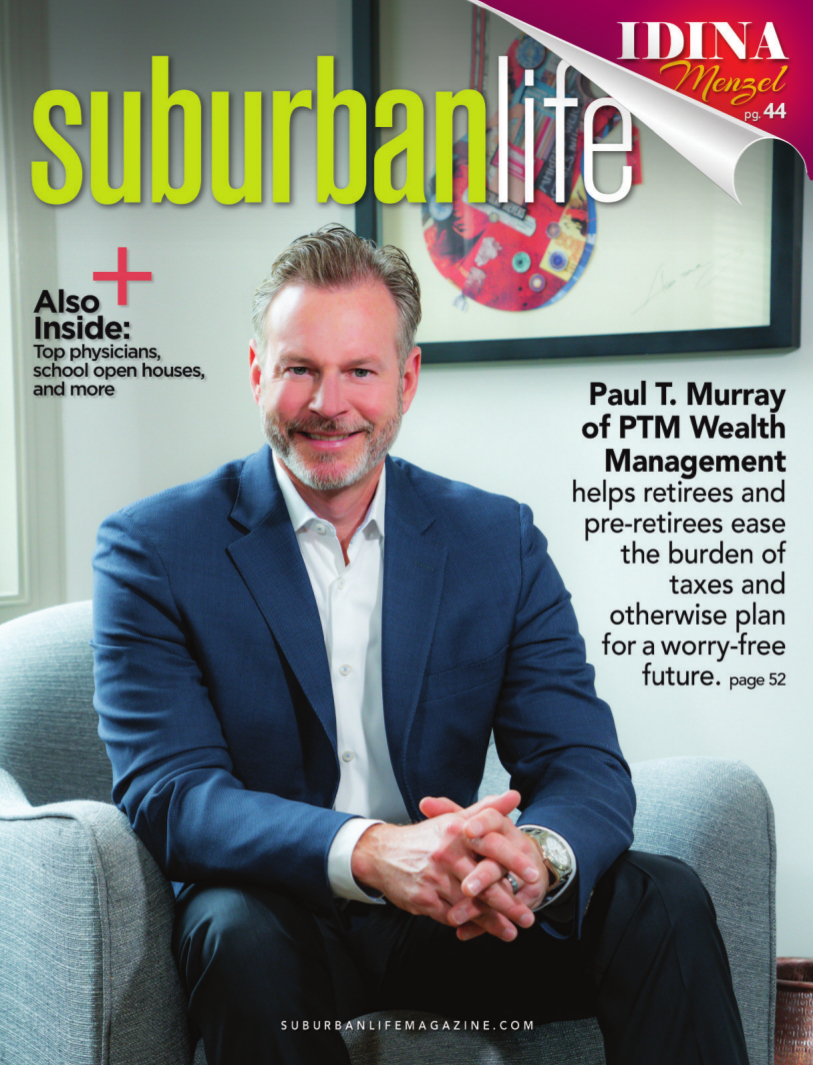
Planning for a Tax-free Retirement
Paul T. Murray of PTM Wealth Management helps retirees and pre-retirees ease the burden of taxes and otherwise plan for a worry-free future.
Everyone imagines their so-called “golden years” somewhat differently. Maybe the plan involves relocating to someplace warm and basking in the sun, sand, and surf. Perhaps it involves jetting or sailing to exotic places. Or maybe it includes playing 18 holes several days a week, hiking amid nature’s many splendors, or writing the next Great American Novel.
Who could ask for anything more? Well, Uncle Sam could.
The term retirement typically conjures daydreams of a carefree lifestyle as their reward for decades of hard work. What many people might fail to take into consideration as they plan and save for retirement is this important fact: The taxman does not stop knocking at one’s financial door upon retirement. The wisest decision one can make well before retiring might be to consult with an experienced financial advisor who can develop and implement a plan designed to reduce, if not eliminate, the burden of taxes in retirement.
Paul T. Murray, AIF®, ChFC®, CDFA®, the founder of PTM Wealth Management, LLC, in North Wales is laser-focused on planning for the likelihood of higher taxes in our future. An Accredited Investment Fiduciary®, Chartered Financial Consultant®, and Certified Divorce Financial Analyst®, Murray leads a staff capable of customizing a plan for each stage of life so retirees and pre-retirees can maximize after-tax income in a world where rising debt and unfunded liabilities will likely force their tax rates higher.
“This is the key differentiator of our firm from most other firms in the area,” Murray says. “Any financial advisor can help you grow your assets. We do that, too. But what’s most important is not how much money you will have at retirement, but how much money you’ll have to spend in retirement after taxes.”
He points to a few brewing trends worth mentioning, including the fact that taxes are scheduled, by law, to increase back to 2017 levels by January 1, 2026. Furthermore, Social Security and Medicare will become insolvent in 2026 and 2034, respectively, if not sooner, according to the 2020 OASDI Trustees Report.
“We’re scheduled to run at least $1 trillion budget deficits in each of the next 11 years,” Murray adds. “The national debt is approaching $30 trillion, and income taxes pay the interest on our debt, as well as fund Medicare and Social Security. Our taxes will have to increase to pay for these fiscal challenges, and many more.”
Millions of Americans have watched their retirement accounts balloon in value in recent years. If a considerable part of one’s assets are held in traditional IRAs or workplace 401(k)-style plans, however, taxes will eventually come into play.
In other words, you may not be as wealthy as you think.
“There’s a big difference between somebody retiring with, say, $1 million in their IRA or 401(k) and somebody retiring with $1 million in a Roth IRA,” Murray explains. “The IRA and 401(k) are going to be subject to higher taxes in retirement, and the Roth IRA that was funded with after-tax dollars will never be taxed.
“So, do you really have $1 million in that retirement account?” he continues. “Every dollar that comes out of an IRAs and 401(k)s is taxed, so if the tax rate is 20 percent, you actually only have $800,000. If taxes increase from there, you have even less to spend. In our Guided Roth Conversion Program, we help our clients shift IRA and other retirement assets from forever taxable to never again taxable.”
Roth IRA earnings are not taxed as they accumulate or when the money is withdrawn. However, Murray suggests the account must be active for at least five years, and the owner must be over the age of 59 ½, before the tax-free provisions on earnings and interest kick in.
Murray shares the views of two notable industry figures: Ed Slott, a nationally recognized IRA distribution expert; and David McKnight, a financial expert and bestselling author of The Power of Zero. Slott views the Roth IRA as tax insurance, in case the federal government raises taxes, which he believes is incredibly likely. McKnight believes that in order to fund those insolvent programs, tax rates will need to double, or benefits must be halved.
Murray, who has earned membership in Slott’s exclusive Master Elite IRA Advisor Group, believes investors must fundamentally change how they save for retirement. “It’s not about how much you save; it’s about how much you save in the right accounts to maximize after-tax income.”
Besides Roth IRAs and Roth 401(k)s, Murray notes that savings in health savings accounts (HSAs), 529 plans for education savings, municipal bonds, to some extent, and the cash value of life insurance, can help reduce income taxes and, potentially, even taxes on Social Security benefits. An HSA is a tax-advantaged account that can help pay for out-of-pocket medical costs in retirement.
“The great thing about HSAs is that we also receive a tax deduction up to a certain limit for contributions,” he adds. “It’s smart to contribute to an HSA now, because medical costs will be much higher in retirement. The 529 plan is also a great way to save and reduce taxes on funding higher education. Avoiding taxation on the growth and distribution of your savings should be your highest priority.”
Municipal bonds are a popular investment for those seeking to reduce taxation but, Murray notes, these investments “still are subject to capital gains, and the interest on these bonds contributes to the taxation of your Social Security benefits.” For most middle-class savers, 85 percent of their Social Security benefits will be taxable. “People are stunned when I tell them their Social Security will be taxed,” Murray says. Distributions from Roth IRAs, however, do not contribute to Social Security taxation.
With more than 20 years of experience, Murray designs financial plans to help clients increase overall after-tax income, minimize or eliminate income-taxable required minimum distributions, and potentially reduce or eliminate Social Security taxation. He strongly suggests it’s never too late to plan to reduce taxes, and never too early.
“I tell people who are now retired or nearing retirement to tell their kids to save in Roth IRAs and 401(k)s,” he adds. “Their money will never be taxed as it grows or when it’s pulled out later in retirement. Increasing taxes is the only way to pay for the debt we’re running up and fulfill our country’s promises.”
He does not mean to frighten people with his gloomy forecast on taxes. Rather, he hopes to shake them out of the false sense of security caused by today’s historically low tax rates. More importantly, he wants to help others better prepare for the future, which is invaluable for all Americans, whether they are in their younger years or their golden years.
PTM Wealth Management, LLC
1501 Lower State Road
Building D, Suite 206
North Wales, PA 19454
(267) 317-1515
Photography by Jody Robinson
Published (and copyrighted) in Suburban Life magazine, August 2021.



